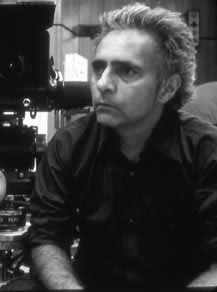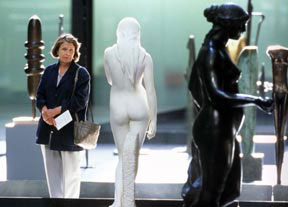Magazine
Quest for the Ordinary

Hanif Kureishi Unplugged.
|
At first blush Hanif Kureishi’s latest film The Mother seems as removed from the desi part of his roots as can be. The story of an elderly Englishwoman from the north of England who loses her husband and then suddenly confronts passion in the shape of a much younger man doesn’t deal with some of Kureishi’s more familiar themes – race relations, fundamentalism, brownness. But there is a South Asian connection. And it’s not just that it’s a reunion between Kureishi, director Roger Michell (Changing Lanes, Notting Hill) and producer Kevin Loader who together once created The Buddha of Suburbia. The South Asian connection to The Mother lies in its genesis. “We were in an Indian restaurant in England and my mother said that the waiter had pretty hands. Then she said she didn’t think anybody would touch her again,” remembers Kureishi. That led Kureishi, whose father passed away ten years ago, to think that though desirability fades with age, clearly desire doesn’t die.
“I thought about a woman who might rebel, hrefuse to be a mother and grandmother,” says Kureishi. “And the hullabaloo it might cause.” It’s not so much the fantasy about doing it. The Mother deals with the crisis that erupts when the older woman actually decides to act upon it. In The Mother when May is first widowed, her busy children try to be understanding and make space for her in their lives, but always in the background. But when she suddenly gets involved with a younger man, who is also her daughter’s on-again off-again boyfriend, all hell breaks loose. But this is no feel good romance for the older woman like the hit Under the Tuscan Sun where a still attractive middle-aged woman finds succor and a hunk in Italy after a shattering divorce in Manhattan. Anne Reid who plays the mother is a stage and television actress who doesn’t bring high voltage start power to the role. “I guess if it had been Charlotte Rampling or Helen Mirren or Julie Christie it would have been easier,” says Kureishi. “But that wasn’t the point. The point was to take somebody who looked anonymous. I am interested in the ordinary; I have always been.” For Kureishi that interest has manifested itself in a rich body of work that has skipped mediums from screenplays to novels and short stories and an upcoming memoir about his father. It has also allowed him to explore a range of issues and never be pigeonholed as the desi writer or the race writer. “I think I get interested in stuff in twos” he says. He ticks them off on his fingers. Buddha of Suburbia (1990) and My Beautiful Launderette (1985) kind of go together. And The Black Album (1995) and My Son the Fanatic (1998). Intimacy (1998) and Love in a Blue Time (2001). Now The Body and The Mother.” But even as he skips over subjects and themes, Kureishi has always returned to his own life for inspiration. He has been pilloried for doing so. His own sister has blasted him for using her life in his stories. In Intimacy he was derided for pitilessly chronicling a marital breakup that very much paralleled his own. An aunt told him he should show good things about the community not drug users and poofters. Kureishi’s response was to name the lesbian character in Sammy and Rosie Get Laid after her. But then he adds more seriously, “I don’t want to upset them but I have to tell a story truthfully for it to be worth telling. But its a big deal for a family to be exposed. You explain to them what you are doing and how it’s not them or it might be a bit of them. But that is tough sometimes.” Even in The Mother, he was a little worried how his own mother would react, especially to the sex scenes involving Reid. “But she loved it,” he says with obvious relief. “She found it liberating. They are rather self-deprecating these women, they don’t think they are important.” Kureishi’s mother came from a working class English family. His father, on the other hand, came from the well-to-do intelligentsia of Bombay. “But he left because he didn’t want to be with a big family. He was one of 12 children. He wanted to be king of his house in the suburbs.” His leaving also effectively deprived him of a homeland since the rest of the family moved to Pakistan. “So he would have no sense of rejoicing in touching his own soil again. Pakistan was just where the family lived,” reminisces Kureishi. Now Kureishi has been going through his father’s papers and manuscripts and reconstructing his life. Some of the material is startling. For example his father writing about going to a brothel for the first time. “It’s disconcerting to be going into a brothel with your dad at age 16,” chuckles Kureishi. “This kind of intimacy with your parents is something we don’t really have. We see them as protectors not sexual beings.” And Kureishi has always been very effective at exploding these taboos. At a time when Islamic fundamentalists conjured up images of bearded old men, in My Son the Fanatic, the father is the liberal while the young son is increasingly drawn into fundamentalism. When South Asians were hardly visible in the media, he gave us Omar in My Beautiful Launderette, young, Pakistani and gay and involved with the most unlikely of partners – a skinhead. That has always been the strength of Kureishi: the complicated canvases he has worked with and the unlikely juxtapositions of characters. “My work is a mixture. Buddha of Suburbia is full of white people,” says Kureishi.
At that time it had seen iconoclastic to people a novel set in Britain with characters that looked like Omar and Karim and Jamila. Now South Asians are everywhere whether it’s Bend it Like Beckham or Bombay Dreams. “That’s how cultures work. It starts at the edges and moves to the mainstream,” says Kureishi. He had visualized Launderette as Godfather like saga that would follow Omar and Johnny’s story over generations. “But Daniel Day Lewis (Johnny) had become a big star and didn’t want to go back to some little English film. Also Stephen Frears (the director) had gone to America by then. So it was hard to get everyone back together,” says Kureishi. More importantly as the British South Asian culture became more mainstream or, as Meera Syal put it, brown became the new black, Kureishi moved on to other challenges. Like getting inside the head of an old woman. It’s a challenge, he admits, but you don’t take it on all at once. “You just imagine an old woman getting out of her bed, putting on her slippers, going to the garden, that’s where it begins,” he says. The man who once took on the politics of Thatcher’s Britian still finds the political landscape, especially post 9/11, fascinating. He is very impressed by how seriously Britons have taken the Iraq war and feels Tony Blair’s only friend is George Bush. “But I am not capable of writing about it,” he says. “It’s too complicated. I have been writing about more intimate things, relationships, my father, the mother. But The Mother is political too, she is marginalized as well. You could call her a minority.” It’s hard to believe that Kureishi, once the hip prophet of a young rebellious mixed-race Britain turns 50 this year. His own twins (who play the boys in The Mother) are 10 while his younger boy is 6. Kureishi looks at the world more through the eyes of a father than the mischievous rebellious teenager whose father thought he was being very English when Kureishi told him he was leaving home to go to university instead of getting married and staying with the family. Kureishi says he doesn’t think too much about aging in a society like Britain as opposed to a family-centric one like Pakistan. He admits it’s often harder for women since so much emphasis is placed on looks. “It’s also a fact that older men commonly go out with much younger women as I myself have done,” he says. “But aging doesn’t scare me. I’m a big man. I can carry on writing. We have to talk about love and death and family and illness and war. I like frivolous things, but I want to live in a serious culture.” |



You must be logged in to post a comment Login